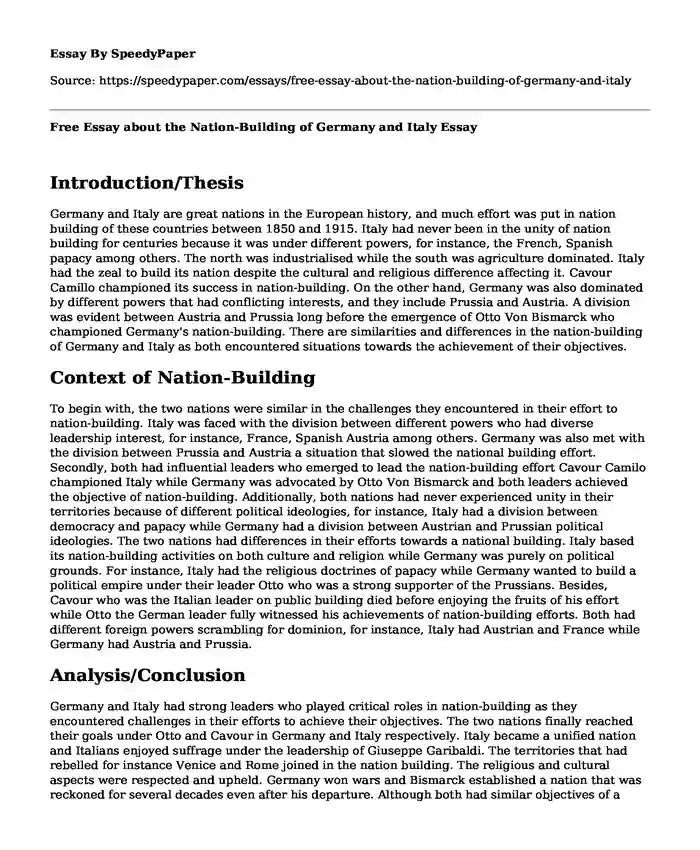Introduction/Thesis
Germany and Italy are great nations in the European history, and much effort was put in nation building of these countries between 1850 and 1915. Italy had never been in the unity of nation building for centuries because it was under different powers, for instance, the French, Spanish papacy among others. The north was industrialised while the south was agriculture dominated. Italy had the zeal to build its nation despite the cultural and religious difference affecting it. Cavour Camillo championed its success in nation-building. On the other hand, Germany was also dominated by different powers that had conflicting interests, and they include Prussia and Austria. A division was evident between Austria and Prussia long before the emergence of Otto Von Bismarck who championed Germany's nation-building. There are similarities and differences in the nation-building of Germany and Italy as both encountered situations towards the achievement of their objectives.
Context of Nation-Building
To begin with, the two nations were similar in the challenges they encountered in their effort to nation-building. Italy was faced with the division between different powers who had diverse leadership interest, for instance, France, Spanish Austria among others. Germany was also met with the division between Prussia and Austria a situation that slowed the national building effort. Secondly, both had influential leaders who emerged to lead the nation-building effort Cavour Camilo championed Italy while Germany was advocated by Otto Von Bismarck and both leaders achieved the objective of nation-building. Additionally, both nations had never experienced unity in their territories because of different political ideologies, for instance, Italy had a division between democracy and papacy while Germany had a division between Austrian and Prussian political ideologies. The two nations had differences in their efforts towards a national building. Italy based its nation-building activities on both culture and religion while Germany was purely on political grounds. For instance, Italy had the religious doctrines of papacy while Germany wanted to build a political empire under their leader Otto who was a strong supporter of the Prussians. Besides, Cavour who was the Italian leader on public building died before enjoying the fruits of his effort while Otto the German leader fully witnessed his achievements of nation-building efforts. Both had different foreign powers scrambling for dominion, for instance, Italy had Austrian and France while Germany had Austria and Prussia.
Analysis/Conclusion
Germany and Italy had strong leaders who played critical roles in nation-building as they encountered challenges in their efforts to achieve their objectives. The two nations finally reached their goals under Otto and Cavour in Germany and Italy respectively. Italy became a unified nation and Italians enjoyed suffrage under the leadership of Giuseppe Garibaldi. The territories that had rebelled for instance Venice and Rome joined in the nation building. The religious and cultural aspects were respected and upheld. Germany won wars and Bismarck established a nation that was reckoned for several decades even after his departure. Although both had similar objectives of a national building, they had different ways of articulating their issues because their challenges and systems of government were different. It is paramount to note that despite the similarities and differences of the two nations objectives were achieved as stable political systems were established, unity among the warring territories, harmony between culture and religion among other aspects.
Work Cited
Kiernan, Victor. The duel in European history: honour and the reign of an aristocracy. Zed Books Ltd., 2016.
Maier, Charles S. Recasting Bourgeois Europe: Stabilization in France, Germany, and Italy in the decade after World War I. Princeton University Press, 2015.
Cite this page
Free Essay about the Nation-Building of Germany and Italy. (2022, Jun 08). Retrieved from https://speedypaper.com/essays/free-essay-about-the-nation-building-of-germany-and-italy
Request Removal
If you are the original author of this essay and no longer wish to have it published on the SpeedyPaper website, please click below to request its removal:
- Conflicts in Organizations and Impact on Organizational Culture - Free Essay in Management
- Free Essay Example: Imperial Debris and Migration
- Free Essay Sample, The Three Faces of Eve: Dissociative Identity Disorder
- Free Essay on Future Directions of Crime Fighting and Social Policy Implications
- Date:Notification of a Lawsuit - Yemen Lawsuit
- What Controls Human Life?
- Essay Example - Changing the Positions of Patients
Popular categories





